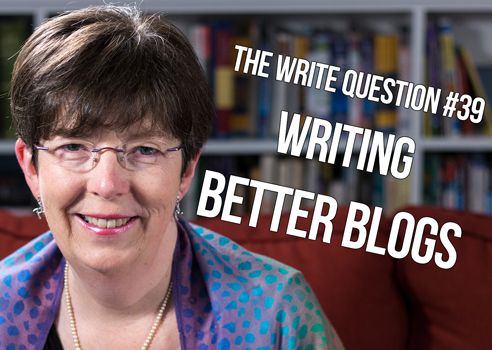Viewing time: 3 mins. 27 secs.
The Write Question is a weekly video podcast about writing that I started in 2017 and that ran, more or less weekly, until April 2022. This is a republication of issue #39, about how to write better blog posts. The post first ran on Dec. 1/17.
Transcript:
Welcome to The Write Question. I’m Daphne Gray-Grant. Today we’re talking about how to write better blog posts.
I’m going to answer a question from Judi Jensen in California. Here’s what she’s asked.
[recording] Hi Daphne, this is Judi Jensen from Santa Cruz, California. I’m interested in your advice on writing blog posts — for example, what process do you recommend? Do you still want us to do a crappy first draft and then still have some time between the draft and the editing process? I’d appreciate any advice you could give. Thank you!
Thanks for the question, Judi. I started my weekly blog back in 2006 and I turned it into a five-day-a-week blog in 2012 so I have a fair bit of experience that should be useful to you.
The very first lesson I learned as a blogger was to trust my ability to meet deadlines. When I initially started, I had the mistaken notion I should write a bunch of posts in advance, so I wrote 18 of them before I published a word. Yes, 18 — it’s beyond me what I was thinking. And guess what happened next? I ignored my need to write for the next 18 weeks and faster than you could say “deluded blogger” I had to write a new column for the very next day. Without trying, I realized it was okay to have a weekly deadline. I didn’t need to write a lot of posts ahead of time, so long as I could write one a week. I think you’ll find the same.
You asked me specifically about process and I’m guessing you’re concerned about how long to let blog posts sit before you edit them. I know I tell book authors they should let their text rest or “incubate” for about six weeks before they edit. Think of this as letting your writing marinate. But I don’t give the same direction to bloggers! My background is in the daily newspaper business so I understand the realities of quick publication. Here’s how to deal with that challenge.
Finish your writing and then go do something wildly different. You can write another story. Read an article or a magazine.Or do some desk work, like filing. In other words, take your mind off your blog post. Then, go back to edit it later the same day.
If you have the ability, make this four hours later. But if time is tight just make sure you’ve distracted yourself enough. Even forty-five minutes can be an adequate distraction.
To my mind, however, the bigger challenge facing bloggers is getting enough story ideas. You may be full of things to say during the first year but once you get more time under your belt, you’re likely to struggle for topics.
To solve this problem, I try to separate the job of writing from the job of coming up with new ideas. I keep a spreadsheet in which I note all ideas as they spring to me or as I see them in other media. I try to plan my topics, in advance, once a month, and then I write my blog posts at a separate time. The challenge of coming up with ideas is very different from the challenge of writing and you don’t want to mix up those two tasks, ever.
Finally, on the subject of blogging, let me take the opportunity to quote Scott Adams, creator of the wonderful Dilbert cartoons: “Blogging is like work, but without co-workers thwarting you at every turn. All you get is the pleasure of a completed task.”
Thanks for your question, Judi. I hope you’re able to enjoy the pleasure of becoming a successful blogger.


